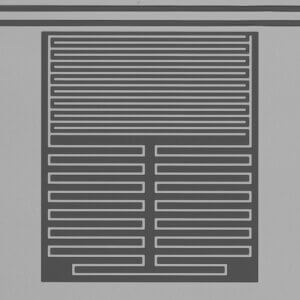Mitigating errors in superconducting quantum circuits to pave the way for future quantum computers
Wednesday, March 22, 2023

Aluminum superconducting electrical resonator circuit. TLSs are defects thought to be located on the surface of the aluminum layer (white) and exposed silicon (gray).
With the quantum age on the horizon, scientists are working to develop quantum computers that will have a processing speed exponentially faster than today’s most advanced supercomputer. Building a useful quantum computer is one of the great engineering challenges of our time. In all implementations, qubits that are reliable, stable, and scalable are essential in this endeavor.
The accuracy and reliability of qubits is being investigated by a group of researchers lead by Dr. Matteo Mariantoni, a faculty member at the Institute for Quantum Computing (IQC) and professor in the Department of Physics and Astronomy at the University of Waterloo. The research team is working with superconducting quantum circuits, which are currently among the leading platforms in efforts to develop a quantum computer.
Using chips comprised of aluminum layers on top of silicon wafers, the group is creating superconducting devices. As researchers build toward fully functional quantum computers with this technology, it is essential to understand and measure the amount of decoherence – the loss of quantum information due to loss or noise – in a circuit. These effects need to be remediated or minimized for any future quantum computer to function well and yield accurate results.
Superconducting circuits are affected by defects in the surrounding material called “two-level systems” (TLSs) which, much like qubits, can be in one of two distinct energy levels, either a ground state or an excited state, at any given moment. In a previous study conducted by the research group, they observed that thermal fluctuations between ground and excited states of TLSs cause qubit decoherence and necessitate constant recalibration of the qubit control parameters. In this continuation of their work, they have shifted their focus from qubits to resonators, another type of quantum object essential for quantum computing, in order to better understand the physics of TLS defects.
Dr. Jérémy Béjanin, a postdoctoral fellow at IQC, was part of the group investigating the fluctuations attributable to TLSs. “Since TLS defects cannot be directly measured, we use resonators as probes to indirectly detect the TLS fluctuations that cause decoherence.”
In the latest experiment, an electromagnetic field was applied to energize the TLS population, then the researchers used a resonator to observe the platform and identify how much of the energy was dampened by TLS defects in the circuit. “You can think of a resonator like a string on a guitar that vibrates at a particular frequency, only in this case it is not an acoustic vibration but an electromagnetic vibration,” says Béjanin. “In our experiments, the resonators are aluminum bands on the chip that resonate, or electromagnetically vibrate, at a specific frequency. We can measure the exact frequency of the resonator and observe how long it rings to determine the quality factor of the resonator.”
Quality factor is measured by how long the resonator will resonate, or vibrate, at one specific frequency. “TLS defects take energy away from resonators, they reduce the quality factor. You can think of them as putting your finger on the vibrating string of the guitar and muting the resonator, or shortening the length of the vibration,” says Béjanin. The researchers used a microwave signal that minimally interacts with the resonator to energize the TLS defects, which has been shown to suppress TLS errors at high power. This allows them to “remove” a fraction of the TLSs that affect the resonator, thereby allowing for a better characterization of the fluctuations. A weaker probe which interacts with the resonator directly is used to track its resonant frequency and infer the quality factor continuously.
This study is the first experiment to monitor resonator frequencies constantly over many days – up to five in this result. Their data shows explicitly that the TLS defects can skew experiments on both short and long time scales. “Because these fluctuations change the performance of qubits and resonators over time in an unpredictable way, they make the results of computation inconsistent and unreliable,” explains Béjanin. “That is problematic for quantum computers.”
Quantum computers based on these superconducting platforms, including those at IBM and Google, are subject to TLS defects and their fluctuations. This research from Mariantoni’s group indicates that any computational system not constantly monitored and recalibrated to account for random fluctuations is likely to produce incorrect results without the user knowing. With this issue present, it will be difficult to make a high-quality quantum computer.
Having done the research to characterize this TLS problem, next, the team is planning to investigate ways to mitigate TLS errors. Understanding such dissipative phenomena as quantum decoherence will pave the way for scaling up future quantum computers.
This research was supported in part by the Canada First Research Excellence Fund through the Transformative Quantum Technologies (TQT) program.
Fluctuation Spectroscopy of Two-Level Systems in Superconducting Resonators published in APS Physics on September 6th, 2022.
